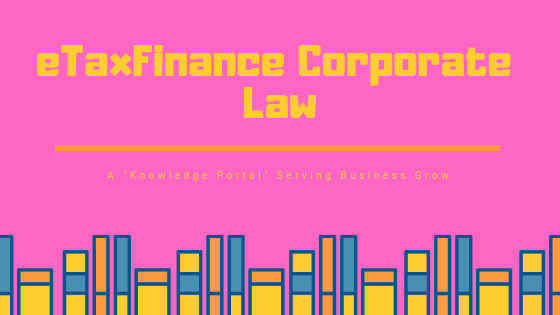What is Ultra Vires?
The term Ultra Vires is derived from the Latin word ‘Ultra’ means beyond, and ‘vires’ means powers or authority. So we can say that anything which is beyond the authority or power is called ultra-vires. In the context of the company, we can say that anything which is done by the company or its directors which is beyond their legal authority or which was outside the scope of the object of the company is ultra-vires.
What is the Doctrine of Ultra Vires?
The Doctrine of Ultra Vires is a fundamental rule of Company Law. It states that the objects of a company, as specified in its Memorandum of Association, can be departed from only to the extent permitted by the Act. Hence, any contract that is beyond the scope of the company’s corporate powers is deemed illegal. Hence, if the company does an act, or enters into a contract beyond the powers of the directors and/or the company itself, then the said act/contract is void and not legally binding on the company. Ultra vires is the opposite of intra vires (Latin for Within the powers).
What is the Purpose of Doctrine of Ultra Vires?
The Doctrine of Ultra Vires is introduced to safeguard the creditors and investors of the company. The Doctrine of Ultra Vires limits the company to the objects specified in the memorandum, the company can be:
- Restrained from using its funds for purposes other than those specified in the Memorandum
- Restrained from carrying on trade different from the one authorized.
The Doctrine of Ultra Vires draws a clear line beyond which directors of the company are not authorized to act. It puts a check on the activities of the directors and prevents them from departing from the objective of the company.
What is the Scope of Doctrine of Ultra Vires?
The doctrine of ultra vires applies only to those companies that have been incorporated or have a separate existence in the eyes of law. All those companies that have not been registered such as sole proprietorship or partnership will not fall under the scope of the doctrine of ultra vires. Only the companies that are incorporated or have a separate existence in the eyes of law come under the scope of the doctrine of ultra vires.
Every illegal transaction or abuse of power by directors or employees of a company will not come under the scope of the doctrine of ultra vires. Only the transactions that are beyond the scope of what a company can do will be liable under the scope of the doctrine of ultra vines.
What are the Exceptions to the Doctrine of Ultra Vires?
Following are the few exceptions to the doctrine of ultra vires:
- Any act which is within the scope of the object clause of the company but outside the authorities of directors can be authorized by the directors.
- The shareholders retain the authority to approve an ultra vires act performed in an irregular way in the company.
- If the company acquires any property using an ultra vires investment, even then the company’s right over that property can be defended.
- Any incidental or serious effects of an act shall not be considered as ultra vires unless it is expressly prohibited by the statute.
What are the Advantages of the Doctrine of Ultra Vires?
The doctrine of ultra vires presents certain advantages:
i) Protection of shareholders: The doctrine of ultra vires assures shareholders that their investments will not be used for any activities other than the ones that were mutually agreed upon.
ii) Protection of creditors: The doctrine of ultra vires also protects the interests of creditors by ensuring that the company’s capital is not spent on any project or business that is beyond the scope of the objects clause.
What are the Disadvantages of the Doctrine of Ultra Vires?
There are a few disadvantages of this doctrine as well:
i) The doctrine of ultra vires makes it impossible for a company to alter its activities in a direction that is agreeable to all members.
ii) It is possible to alter the object clause of the Memorandum via a special resolution, thus defeating the main purpose of the doctrine.
What are the Effects of Ultra Vires Transactions?
Following are the effects of ultra vires transactions:
i) Injunction
Any member of the company can bring injunction against the company to restrain it from doing ultra vires acts.
ii) Liability of Directors towards the Company
The directors of the company are personally liable to make good those funds of the company which they have used for ultra vires It is the duty of the directors of the company to employ funds and properties of the company for the purposes laid down in the memorandum of association of the company.
iii) Liability of Directors towards the Third Party
Directors are the agents of the company. It is their duty to conduct the affairs of the company within the powers of the company as laid down in the memorandum. Where the directors represent the third party that the contract entered into by them on behalf of the company is within the powers of the company, while in reality the company has no such powers under the memorandum, the directors will be personally liable to the third party for his losses on account of breach of warranty of authority.
iv) Contract Void
A contract which is ultra vires the company will be void and of no effect whatsoever. “An ultra vires contract being void ab initio, cannot become intra vires by reason of estoppel, lapse of time, ratification, acquiescence or delay”. However, if the contract is only ultra vires the powers of the directors but not ultra vires the company, it may be ratified in the general meeting and thereby the company will be bound by it.
v) Ultra vires acquisition of Property
When money of a company is spent ultra vires in acquiring a property, the right of the company over that property would be secure. This is because the property represents corporate capital, though acquired wrongly.
However, where the payment for an ultra vires acquired property/asset has not been made, the vendor can obtain a tracing order to recover the property from the hands of the company. A company cannot be allowed to benefit from such transactions at the cost of the other party.
vi) Ultra vires Borrowings
A bank or other person lending to company for purposes ultra vires the memorandum cannot recover the money under that loan agreement. But nothing prevents the company from repaying that money. The lender is also entitled to a tracing order, and if the money lent is traced in specie or into any investment held by the company, the lender can recover it from the company in that form. Further, if that money is used by the company in discharging any debts or liabilities of the company, the lender will, on accounts of principle of subrogation, step into the shoes of the creditors whose claims have been paid off by the company and acquire rights against the company.
vi) Ultra vires Lending
If the money has been lent by the company and the lending is ultra vires, the contract would be void. No action can be brought on it, but the company can sue for recovery of its money. This is because the borrower who has made a promise to repay that money, cannot be allowed to refrain from paying it back on the ground that it is without authority.
For more details contact out team at +91-7991109093 or drop email us at [email protected]
Note: This Post was last updated on December 1, 2022
Disclaimer: The entire contents of this document have been prepared on the basis of relevant provisions and as per the information existing at the time of the preparation i.e. December 1, 2022. Although care has been taken to ensure the accuracy, completeness and reliability of the information provided, We assume no responsibility therefore. Users of this information are expected to refer to the relevant existing provisions of applicable Laws. The user of the information agrees that the information is not a professional advice and is subject to change without notice. We assume no responsibility for the consequences of use of such information. IN NO EVENT SHALL WE SHALL BE LIABLE FOR ANY DIRECT, INDIRECT, SPECIAL OR INCIDENTAL DAMAGE RESULTING FROM, ARISING OUT OF OR IN CONNECTION WITH THE USE OF THE INFORMATION.


